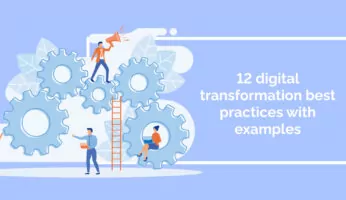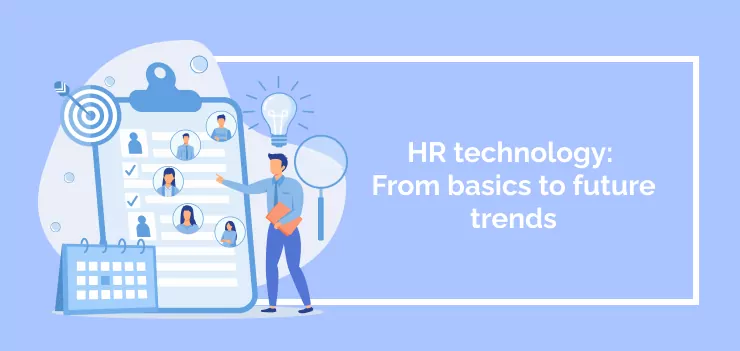
At its core, HR technology refers to any software, platform, or digital tool that helps manage the multifaceted tasks of human resources.
These tools have been designed to streamline processes, reduce manual efforts, and improve overall efficiency in HR departments, from recruitment and performance reviews to payroll and benefits administration.
Over the last few years, we’ve witnessed an immense shift in the HR landscape.
The traditional pen-and-paper methods and Excel sheets have given way to innovative digital platforms.
Gone are the days when HR was just about maintaining employee records and handling payroll. In today’s fast-paced, data-driven world, the role of HR has evolved significantly, becoming more strategic and data-oriented.
That’s where HR technology comes into play, acting as the driving force behind this digital transformation, making HR operations more efficient, accurate, and insightful.
In this article, we’re taking you from the basics to the breakthroughs. We’re sharing everything you need to know about HR technology, its role in modern businesses, and the current HR technology trends to keep an eye on.
We’re also covering the benefits of integrating HR technology and some practical tips for choosing the right tech for your business.
The importance of HR technology in the modern business landscape
Today, HR technology is a strategic enabler that helps you attract top talent, drive employee experience, and make informed decisions based on data-driven insights.
Moreover, in the wake of remote work trends, it’s become the lifeline that connects your dispersed workforce.
With the right HR tech, you can facilitate seamless communication, support employee well-being, and cultivate a strong organizational culture – regardless of your team members’ location.
A 2023 Mckinsey survey found that 78% of organizations think “capability building” is important to their long-term growth. And yet, only 30% report that their capability-building programs actually help them achieve organizational impact.
These statistics show HR professionals’ biggest challenge: a disparity between what leadership wants and what you can achieve. HR technology is essential in helping you bridge that gap.
5 key benefits of integrating HR technology
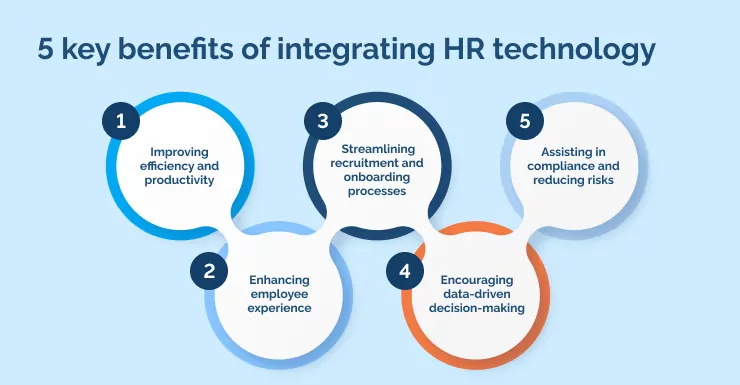
Harnessing the power of HR technology can have plenty of benefits for your organization.
In a nutshell, integrating HR technology into your workflow can lead to significant improvements in efficiency, employee experience, data-driven decision-making, and risk management.
The right tools can revolutionize your HR operations and help you stay ahead of the curve.
From supercharging productivity to fostering better employee experiences, let’s delve into the 5 key benefits.
1. Improving efficiency and productivity
One of the most apparent advantages of integrating HR technology is the role it plays in an automation strategy.
By automating administrative tasks such as payroll processing, benefits management, and timesheet tracking, you free up significant time for your HR team.
This time can then be devoted to more strategic, high-value tasks – effectively enhancing productivity across the board.
2. Enhancing employee experience
HR technology isn’t just for HR professionals; it also significantly benefits your employees.
Digital platforms offer self-service options, allowing your team to update personal information, view payroll data, and request time off independently.
This level of transparency fosters trust, and engagement, and ultimately improves the overall employee experience.
3. Streamlining recruitment and onboarding processes
Recruitment can be a complex, time-consuming process, from posting job ads and tracking applications to scheduling interviews and onboarding new hires.
HR technology can simplify and streamline these processes.
Tools like Applicant Tracking Systems (ATS) can automate a lot of these tasks while also providing a seamless candidate experience.
4. Encouraging data-driven decision-making
In the age of big data, HR technology plays a vital role in transforming raw data into actionable insights.
These insights can help you make informed decisions about hiring, employee development, compensation, and more.
Moreover, predictive analytics can help you anticipate future HR needs and trends, giving you a competitive edge.
5. Assisting in compliance and reducing risks
Staying compliant with ever-changing labor laws and regulations can be a daunting task.
HR technology can ease this burden by providing automated updates and reminders related to compliance.
In addition, these tools can help safeguard sensitive employee data, significantly reducing the risk of data breaches.
6 Key HR technologies every professional should know
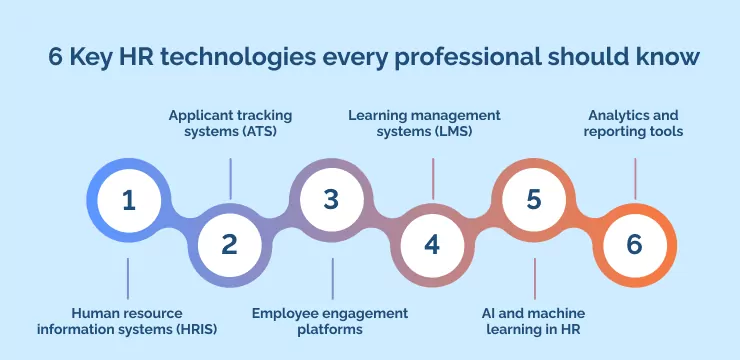
You need to be familiar with various HR technologies designed to streamline your operations.
Understanding these key HR technologies is crucial if you’re aiming to use digital tools to enhance your business practices.
With the right technology in your arsenal, you’re well-equipped to tackle the challenges of the modern HR landscape and drive your organization’s success.
Here’s a breakdown of 6 essential tools you should have on your radar:
1. Human resource information systems (HRIS)
An HRIS is a comprehensive software that helps manage and maintain all employee data in one place.
From personal details and employment history to performance records and benefits information, an HRIS is a one-stop solution for all your HR data needs.
It also facilitates tasks like payroll, time tracking, and benefits administration, making it an indispensable tool for HR teams worldwide.
2. Applicant tracking systems (ATS)
As the name suggests, an ATS is a digital tool streamlining recruitment.
It helps you post job openings, filter and sort applications, schedule interviews, and track candidates through the hiring pipeline.
By automating these tasks, an ATS saves you time and helps enhance the candidate experience.
3. Employee engagement platforms
Employee engagement platforms boost employee morale, engagement, and productivity.
These tools offer recognition and rewards, social feeds, pulse surveys, and communication channels to foster a positive work culture.
They provide real-time insights into employee engagement, helping you take proactive measures to maintain a happy, motivated workforce.
4. Learning management systems (LMS)
An LMS platform manages, delivers, and tracks employee training.
Whether onboarding new hires, offering skill development courses, or complying with industry-specific training, an LMS ensures that learning opportunities are accessible to all employees anytime, anywhere.
5. AI and machine learning in HR
Artificial intelligence (AI) and machine learning are revolutionizing HR functions.
They can automate repetitive tasks, provide predictive analytics, and even assist with candidate screening and interview scheduling tasks.
AI chatbots, for instance, can answer employee queries in real-time, improving efficiency and employee experience.
6. Analytics and reporting tools
Data is the lifeblood of strategic HR decisions, and analytics tools are what make this data usable.
These platforms gather data from various sources and turn it into visual, easy-to-understand reports.
This not only helps you track key HR metrics but also allows you to uncover trends and insights that can inform future strategies.
5 steps for selecting the right HR technology for your business
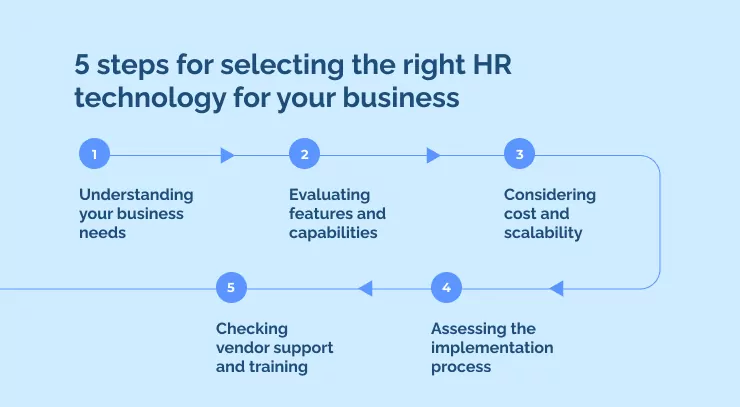
Choosing the right HR technology can be a daunting task, given the vast array of options available.
Selecting an HR technology is not about choosing the most popular or the most advanced option but about finding the tool that best aligns with your organization’s needs and capabilities.
A well-chosen HR technology can make a world of difference in improving your HR operations.
Here are 5 steps you can follow to help you make an informed decision:
1. Understanding your business needs
Before exploring different HR technologies, you need to first understand your business needs.
What HR processes are you looking to improve? What challenges are you currently facing?
Answering these questions will help you identify the key features you need in an HR solution.
Remember, there’s no one-size-fits-all solution, so it’s crucial to identify what your organization specifically needs.
2. Evaluating features and capabilities
Once you’ve outlined your needs, evaluate the features and capabilities of potential HR tools to see if they align with your requirements.
Make a list of ‘must-have’ and ‘nice-to-have’ features.
Must-haves are non-negotiables, while nice-to-haves are features that would be beneficial but not essential.
3. Considering cost and scalability
Budget is always a key consideration.
Consider both the upfront costs and ongoing expenses, like updates or additional features. Moreover, look for scalable solutions.
As your organization grows, you want a tool that can grow with you rather than having to switch systems down the line.
4. Assessing the implementation process
Implementing a new HR system can be a complex process.
You’ll need to migrate data, integrate the new system with existing platforms, and train staff.
Consider how much time and resources are required for these processes. Some vendors offer implementation support, which can be a significant advantage.
5. Checking vendor support and training
Finally, consider the level of support provided by the vendor.
Do they offer comprehensive training to help your team adapt to the new system? What about ongoing support or customer service?
Adequate employee training and support can make a significant difference in successfully adopting a new HR tool.
Future trends in HR technology
As you continue to navigate the digital landscape of HR, it’s essential to stay ahead of emerging trends.
The HR tech space is evolving rapidly, and staying informed will help you adapt and thrive.
These trends hint at an exciting future for HR technology. By staying informed and open to these advancements, you can ensure your HR practices remain effective, innovative, and ahead of the curve.
Here’s a look at some trends shaping the future of HR technology.
AI and machine learning advancements
AI and machine learning continue to make significant strides in HR.
These technologies are getting more sophisticated, capable of performing tasks such as analyzing employee engagement levels, predicting turnover, and even assisting in diversity and inclusion efforts.
We expect AI to play an increasingly central role in shaping HR practices as we move forward.
The rise of HR analytics
HR analytics has been on the rise, and this trend is set to continue.
Organizations are increasingly recognizing the value of data-driven decision-making in HR.
With advanced analytics tools, you can dig deeper into your HR data, uncover insights into employee satisfaction, performance, and retention.
Increasing emphasis on employee wellness
The COVID-19 pandemic has underscored the importance of employee wellness.
This focus is increasingly being reflected in HR technology, with tools designed to monitor employee well-being, facilitate work-life balance, and provide resources for mental health.
In the future, these features will likely become standard in HR platforms.
Virtual and augmented reality in training
Virtual reality (VR) and augmented reality (AR) are beginning to make their way into the HR space, particularly in training and development.
These technologies can create immersive, interactive learning experiences, making training more engaging and effective.
While still in the early stages, VR and AR in HR is a trend worth watching.
Blockchain technology in HR
While still a very new and misunderstood trend, blockchain technology holds potential for HR.
Blockchain could provide secure, unalterable records for things like employment verification, background checks, and even compensation.
As the technology matures, it could offer unique solutions to some long-standing HR challenges.
HR technology: transforming the human resources landscape
In the digital age, HR technology plays a pivotal role in streamlining processes, enhancing efficiency, and fostering data-driven decision-making.
It improves the employee experience, simplifies recruitment, and aids in compliance and risk management.
Essentially, it’s the linchpin that holds together modern, effective HR practices.
Looking ahead, HR technology will continue to evolve and shape the future of HR.
As you navigate this future, keep your focus on the ultimate goal: to create a more efficient, effective, and positive environment for your greatest asset—your people.
In the hands of forward-thinking HR professionals, HR technology is more than just software; it’s a catalyst for meaningful change.
WalkMe Team
WalkMe spearheaded the Digital Adoption Platform (DAP) for associations to use the maximum capacity of their advanced resources. Utilizing man-made consciousness, AI, and context-oriented direction, WalkMe adds a powerful UI layer to raise the computerized proficiency, everything being equal.


